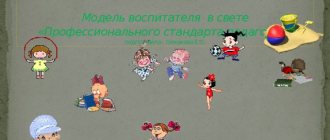Organization of work of specialists in a group for children with disabilities
In our preschool institution, we have developed our own system of correctional and developmental work with children with disabilities.
Educators, a speech pathologist, an educational psychologist and other specialists available at the preschool educational institution work in close contact with each other. They strive to have a unified approach to raising each child and a unified style of work in general.
Since the effectiveness of frontal classes with children with disabilities is very low, all work is carried out in individual and subgroup form.
The schedule of classes is designed so that every child receives correctional and developmental assistance every day. The number of classes per week does not exceed the established standards.
In the first half of the day, classes are held with both educators and a speech pathologist. In the afternoon, classes are held by a teacher-psychologist and individual work on the instructions of a speech-language pathologist. The teacher-defectologist is the organizer and coordinator of all correctional and developmental work in this group.
A speech pathologist teacher conducts classes on speech development, the formation of elementary quantitative concepts, and also classes on familiarization with the environment.
Teachers conduct classes on familiarization with the environment, art activities, construction and manual labor. They consolidate the knowledge acquired by children, practice skills until the skills are automated, integrating correctional goals and content into the daily life of children (in play and work activities), in the content of other activities (visual activities, observing others), as well as during routine moments.
To ensure such unity in the work of all teachers and specialists in this group (for children with disabilities), we have developed the following system of activities in our kindergarten:
Teachers, together with a speech pathologist and educational psychologist, study children.
Specialists individually examine children and monitor them during classes. Educators study children in classes and in everyday life - during routine moments, on a walk, during free activities.
The results are discussed and analyzed by the entire teaching staff of the group, led by the preschool methodologist. Achievements and shortcomings in children's education are discussed, and ways of correction are outlined.
The content of the program is jointly studied and a long-term work plan is drawn up for all types of children’s activities and for all sections of the program (familiarization with the environment, productive activities, play activities, etc.).
Here it is necessary to take into account that the teacher-speech pathologist must know the content of not only those sections of the program in which he directly conducts classes, but also those that are taught by the teacher. In turn, educators must know the content of the types of work that a speech pathologist teacher conducts. At the same time, we must remember that the teacher, conducting his own types of classes, is in no way a “tutor” and does not study with the children the material of the speech-language pathologist’s classes. Proper planning ensures the necessary repetition and reinforcement of material in different types of children’s activities and in different situations.
Celebrations, entertainment, thematic and integrated activities are jointly prepared and carried out.
These classes are the result of all correctional and pedagogical activities with children over a certain period. In order for all the children’s potential to be revealed and realized, the entire teaching staff of the group must work on their preparation together with the music director.
We work closely with parents.
The main task of teachers when organizing work with parents is to help them become interested, active and effective participants in the educational process. Teachers explain to parents the need to work daily with their child on tasks given by the speech pathologist and educators, and the unity of the requirements of teachers and parents. Only in this case are the best results possible.
Methodist as interaction coordinator
Organizing a system of methodological work with personnel in kindergarten is one of the important tasks of preschool education. Sometimes in teaching teams, the role of the teacher - the main person closest to the child, when there are different specialists in the kindergarten, is underestimated. The problem of organizing interaction between a teacher and specialists to create conditions for the personality-oriented development of a child is relevant.
Why is this problem relevant? Working with children requires a lot of effort and energy from the entire teaching staff, so the main goal is to create a group of like-minded people.
Problems arise in organizing the interaction of specialists in the management aspect:
- a clear definition of which teacher is the main one in solving a particular problem in the upbringing and development of children;
- with whom he interacts;
- what is the share of participation of everyone else.
The methodologist takes an active part in clarifying the job responsibilities of narrow specialists, determines the forms and methods of their interaction with each other, taking into account the age characteristics of children. Thus, the performer is assigned very specific tasks and responsibilities, which are under the control of the methodological service. There must be certainty: who is doing what and by when, and interacting with whom. It is the interaction of all specialists that is considered as a condition for the development of a kindergarten.
The role of the methodologist in the management system of an educational institution is leading in the organization of scientific and methodological work in kindergarten, aimed at forming a teaching team of like-minded people who are able to introduce modern scientific research and the best pedagogical experience in raising and teaching children.
Subject specialists, professionally engaged in one of the areas of preschool education, experimenting, finding and introducing new teaching technologies, have a greater opportunity than educators to study in specialized courses. Therefore, a specialist can methodically competently advise educators on his section of the program:
The task of the methodologist is to organize a joint search for productive ways to develop education in the teaching staff.
In this regard, the content of the methodological support functions changes, they receive appropriate content:
- informational and normative – involves informing teachers about documents related to the protection of children’s rights, changes in the functional responsibilities of teachers, new achievements in the field of pedagogy and psychology of preschool education, as well as correctional pedagogy and psychology;
- analytical – determines the creative potential of a specialist and his individual style of activity; provides training in collective relaxation, self-analysis of activities;
- coordination - determination of near, medium and long-term prospects for the implementation of the preschool educational institution plan (coordination of the annual and monthly long-term plans of the preschool educational institution and personal plans of specialized specialists);
- innovative - determines the development and search, together with narrow specialists, of new progressive technologies, methods and techniques for raising children and their implementation in practice;
- controlling – allows you to monitor the quality of work, ensuring the implementation of state standards in the training, education and correction of disorders of preschool children, excluding overload.
Based on the functions, we can highlight the main directions of the methodologist’s work:
- educational – creating a system for managing the work of specialized specialists, implementing a person-oriented approach to improving their qualifications through determining the individual educational route of each teacher;
- research – determining the direction of research work in accordance with the priority area of work of the preschool educational institution; expanding research on various educational issues;
- diagnostic – monitoring the effectiveness of training and education processes, allowing to determine the quality of educational services;
- informational – providing methodological support in the creation, development, implementation and dissemination of innovations in the teaching staff and other educational institutions.
The areas of methodological work with specialized specialists make it possible to ensure the following components of its structure:
- competent personnel;
- education and upbringing system;
- planning the educational process;
- coordination of innovative experimental creative activities;
- creation of a subject-development environment.
Interaction of specialists
Particular importance is given to organizing interaction in the work of specialized specialists and educators in correctional educational institutions.
The purpose of this work is to create a model of interaction between teachers, parents and medical personnel in the process of correctional and developmental educational activities, to remove contradictions, change parental attitudes, increase the professional competence of teachers and train parents in new forms of communication and support for the child, organize a subject-based correctional and developmental environment, stimulating the development of the child.
The content and structure of pedagogical support largely depends on the diagnosis, structure of the defect, compensatory capabilities of the child, “the zone of his current and immediate development,” and a person-oriented approach.
Therefore, the model of correctional and developmental activity is an integral system. Its goal is to organize the educational activities of an educational institution as a system that includes diagnostic, correctional, developmental and preventive aspects that ensure a normal level of intellectual and mental development of the child.
The content of correctional and developmental activities is built taking into account the leading lines of the child’s development and ensures the integration of the child’s speech, cognitive, environmental, artistic and aesthetic development. The implementation of this attitude is ensured by the flexible use of traditional and non-traditional means of development (articulation, finger and breathing exercises, physiotherapy, phytotherapy, aromatherapy, music therapy, logorhythmics, etc.).
The system of correctional and developmental activities provides for individual, subgroup and frontal classes, as well as the child’s independent activity in a specially organized spatial environment.



